#the tale of aragorn and arwen
Text
Aragorn's surprised to learn Arwen is Elrond's daughter in the RotK appendices not only because elven lifespans means 'whoops, everyone just forgot the little mortal boy needed to be told Elrond has a third child!' but also because on the rare occasions when he heard Elladan and Elrohir talking about some girl named "Arwen," it was them talking about her in a familial way and in relation to how a boy like Estel would have felt about her - i.e. an annoying little girl: "augh remember when arwen threw our quivers onto the roof, all because we wouldn't play goblin tea party with her?" elladan says
"what is goblin tea party even supposed to be?" asks child estel
"making mud and sticks into little cakes and finding more creative ways to insult the other person," elrohir says
"and if you can't come up with a good insult, you get a mud pie to the face," elladan says. "what's she up to nowadays with grandma?"
elrohir says, "last i heard she was learning how to make lembas from three acorns, a burnt doily, and the ground bone-meal of a squirrel. grandma galadriel says you can never be too prepared."
"that's first age, trauma, that," elladan sighs. they go back to teaching estel how to follow deer trails and skin rabbits.
and Aragorn files this information away as 'ARWEN: Feral Sinda (Avari?) (Elven???) Girl-shaped Creature' that Elrond's family are for some unimaginable reason attached to. Then a decade later he sees Arwen through the trees and it's a ✨meet cute✨ cause he thinks she's like Lúthien, blah blah he's obviously smitten, he puffs out his chest and gives her his Big Boy chieftain name and title. She smiles and nods politely.
And then she says her name and relation to Elrond and Aragorn screams a little inside and has to scramble for pretending like he hasn't heard of her, or even that Elrond's family are immortal, in order to cover the shock that he would have expected her to come crawling out of the underbrush a wild preteen gremlin witch with twigs in her hair, and is instead the Ladiest Lady that ever Ladied. Confessing that her brothers have been sharing embarassing childhood stories with you, the mortal foster-brother, is not first date material.
#lotr arwen#the tale of aragorn and arwen#lord of the rings#elrond#elladan#elrohir#tolkien#canonically adjacent but certainly not what tolkien intended#aragorn#arwen#he's not turned off by the knowledge she can change between High Society and Feral Bastard as well as he can#he is a little excited by it in fact
84 notes
·
View notes
Note
Aragorn/Arwen, 63
#63 -- tujhe dekha toh from dilwale dulhania le jeyenge
ok so the soulmatism of it all had me going completely nuts (simrans waking dreams.....i need to lie down) & before i knew it i'd re-read their appendix had 3 literary analysis epiphanies and was neck deep in the wiki page on love death and meaning and the paradox of religion and nonreligion in tolkein
i say all that like i didnt just write movie verse kidfic lol.
ellie is a shortened version of "nethel" which means sister in sindarin. in a different time in my life i would have named every single one of canon girldad aragorns "many daughters" & also included 5 of them but alas, at this time i am Busy. so we'll pretend that the other 3 havent come along yet. arwen has magic powers she will be fine.
enjoy!
“My lady Luthien!”
The words come into Arwen's dream in the common tongue, whispered and full of a child’s awe. He is speaking as if to himself — the text has surprised him, or perhaps absorbed him so that he does not realize his mouth is moving, disrupting the Sindarin read privately in his thoughts with an impulsive, delighted exclamation.
To Arwen it is just as mesmerizing. She cannot know why her dream has brought her here, to this garden of her father’s House she has sought refuge in so many a time. She knows him very little, this child, not ten in the years of Men and so very human about it, with lanky limbs folded up against himself to cradle the book and a mop of dark hair that falls down over his eyes and the very beginning of spots on his chin (of endless intrigue to Arwen, who has only ever seen skin unblemished).
She has not met him, but knows of him from her brothers’ letters: her father’s ward, sweet and grave and beloved amongst the Rivendell kindred as any novelty in the shape of a child might be. But Estel earns it, too. He is earning his presence in her dream in the same way, sat in the exact spot she always chooses, under bows of trees she has long considered friends. He earns it, though Arwen doesn’t quite know why he’s here.
Don’t you? ask her thoughts of her self, and she does not answer.
Years pass, and she is home again.
“My lady Luthien,” he says, as she comes toward him, and within his voice is a gentle embarrassment that still manages to tease.
Arwen, firm in her earlier, gentle rejection (he is far too young), cannot help but find this terribly charming anyway. It is just after dinner, and she has found him behind a pillar to the side of where they dine. He holds his cup in both hands. Until her appearance he was studying the carvings on one stone edifice to their side, and seems in every way his mortal age save one: there is a new and convoluted weight in his eyes that was not there in the early afternoon, when he called so clearly and sincerely to her. It seems to have entered like the broken branches of a sapling swept into a fast-moving stream after a storm.
“I should be greatly flattered, Estel, to be compared thus,” Arwen says, offering that weight a smile. Estel drops his eyes back to the pillar. He seems to start and stop a few times before actually opening his mouth, and when he does,
“I should like to still be called Estel, for a while yet,” and there is great vulnerability there, in his young man’s eyes. It sneaks into her breast and cups a hand over the breath she draws, and despite the glade, and his youth, and the Truth her father has now shared with him, she is compelled: Arwen’s own hand slides over his knuckles, and they are holding the cup together.
“I will,” she promises. “I do.”
On the edge of the last word do his eyes flick up to hers, canny in a way that sparks beneath her skin. He lives up to his name, she thinks then (not quite knowing why), and when she writes this to him after they have parted, in the letters they now share, he writes back: so do you.
Before Estel, her experience of Death was altogether different. She knew it first in abstraction and then in keen loss. Now she feels its imminance and urgency, in both grand and mundane ways.
For example, earlier this evening, Arwen thought she might die if she did not kiss him. It was a thought that crept over her swiftly, silent and keen as a fresh ice water brook spilling into open hands, very different from the thundering roar of the river spirits she had summoned to herself – until it was suddenly quite the same, roaring, and it must have shown in her eyes. In the late quiet of the night she came to her rooms and found him, there.
(She has long since known why.)
The employment of her tongue is not new, but pulls a murmur out of him regardless. “My lady Luthien,” he starts, speaking almost directly against her mouth, with a wry amusement that is not so unburdened as to be playful and not yet a warning, either, and then he is properly startled into, “Arwen —!” when her next kiss includes a bite. The rasp of beard against her chin is uncomfortable and delightful. She can feel the rumble of her small victory in his chest. Aragorn has always done so much with just the two syllables of her name.
When she has lost all breath she pulls away, and does not pant — sweet air made salty by urgency comes in and out of her lungs in discordant sighs — but her lips stay hot against his ear and she feels every press of his fingers against the slope of her waist, burning. She thinks of death again; she has fought it off. Twice in one week now, in very different ways.
Aragorn does pant, in his own way. He lets out a quiet gasp and drops his head against the side of hers, not trembling but finding some stronghold deep within himself that begets composure.
Slowly she begins to comb her fingers through the hair at his temple. In the dark alcove of her rooms (safe), they sway together.
“Tomorrow,” he murmurs, and she knows: tomorrow the council is held.
“I meant it, earlier,” says Arwen softly, into his hair. It has begun to grey, the strands too hidden yet to shimmer in the moonlight but there nonetheless. Every so often she will catch a glimpse of them and it will leave her wordless, and desperate to touch him. “Your fears are not the truth you think them to be.”
“Arwen.” She can hear the desperation that threatens to choke his own voice. Duty turns the peaceful twilight of her home into a foreboding shadow. There are two large warm hands on her face before she has noticed them move, and then she feels the wetness of her own cheeks: she had not realized she was crying.
“I did not know it would be so momentous to love,” she says, while he wipes at her tears with war-roughened, gentle fingers. So many things about Men are a paradox. So many things about this man.
“Meleth,” he says.
“I meant it.” She repeats herself. “I know who you are in my heart, Estel.”
“You do,” he allows her, and she is not certain he believes it to be enough. No matter, Arwen thinks: her own belief will sustain them. It must, long enough that he has hope for himself as well as for Men, and then they might cross through the door, to the other side of the Dark.
The Queen finds her husband in Faramir’s study, reading.
“My lady Luthien,” she is greeted, words threaded full of the subtle humour that has turned her head for over sixty years.
Arwen clasps her hands over the laden basket she packed without needing any kind of foresight and sighs thinly.
“I did expect, mel nin, that you had gone the whole day without food, but I had thought you would be found holding grave council, or visiting the head healer, or even – forgivably – in the stables. Instead, you are here, nose-deep in an ancient poem.”
“It did not come to you in a vision?” he asks, and raises his eyes just enough to catch hers from beneath his lashes. This does nothing to diminish the focus etched into his dark brow, nor the way he holds himself (always it calls to her – it does not matter the shape), nor the deep blue of his mantle sweeping against the floor; he has not paused to change since returning from the Southern Wall. Whatever peace he thinks his feigned innocence will win him, she cannot know.
“Your Steward told on you, my love.”
“Aaah,” his face falls, so dramatically it is amusing.
She holds up her basket. “I have lunch.”
“My beloved wife has developed the sensibilities of a Hobbit,” Aragorn says, in her people’s language.
“Hobbits are good and noble creatures,” she retorts. She always argues better with him in Sindarin anyhow, “and have traditions from which we might learn.” She arches a brow: “Estel.”
“I am eating,” protests Aragorn, somewhat weakly. “I mean – I will.”
“You might do so now. With me – there is no one else here.”
It is a potent suggestion, she does acknowledge. She watches him think about it, proud to note all the little tells which she has known since he was a barefaced and impulsive young man. The same canny look sparks under Arwen’s skin. Once, decades ago, she had met him in the wild woods beyond her father’s borders in a stolen moment between darkness and duty, and convinced him to bathe with her in the river. She remembers her joy at seeing his wet dark hair plastered all over his forehead. She remembers his own joy, and how it fought off the lonesome blanket of the gathering shadow.
“Your thoughts are of something I know,” Aragorn says now, suspicion arching his tone and narrowing his bright eyes, no longer that of a young man but still full of a life that thrills her. “Some joyful mischief that you’re going to coax me into again, no doubt.”
“There is sadly no river in the palace.”
“Aaah,” uttered in a very different tone from before. His eyebrows twitch out of their focused furrow and his face warms with the memory. He lowers his book a little. “Arwen …”
But he does not move from his spot behind the desk, so Arwen places her basket down and sweeps forward, intent. The silver in his hair streaks liberally now, and lines furrow down his cheeks when he laughs – often – but otherwise Aragorn remains mostly unchanged from the presence filling so little yet so much of the many years of Arwen’s memory. Affection rushes through her, swelling like the river, growing like the trees in Lorien. That glade, too, is a memory full of joy. He is much better suited to a beard, though. Arwen tells him this.
“So you have said many many times,” Aragorn says, chuckling. “I have no plans of removing it from my face, beloved.”
“I know,” Arwen hums. “I am only observing.”
Slowly she comes around the desk, on even steps, until they are very nearly touching and she can fold her hands over the top of his book. She takes a long moment to look at him, and though she in her chosen mortality no longer carries the same potency of power that Tinuviel’s blood held before, she conducts her habitual scan of his spirit, the truth of it ebbing through her fingers where they touch. Beyond her duties as Queen (of which there are many, and she both capable and willing) this is what Arwen knows most deeply in her heart how to do.
Finding Aragorn no more burdened than usual (though perhaps a little distracted) she leans in to whisper in his ear.
“Ah –” he clears his throat and touches two long brown fingers to her arm. Unexpectedly, then, Aragorn stage whispers, “We are not … as alone as it seems.”
“What exactly do you mean?” Arwen, paused very close to his mouth, is compelled to whisper back.
And then,
“It’s alright!” comes a familiar little voice from seemingly nowhere, and all at once Arwen looks down to see the outside shape of the King’s voluminous cloak wriggle. Her mouth parts in surprise. The whisperer continues importantly, “You may kiss Ada if you like, Naneth. We are not looking!”
“Ssssshhh!” materializes a second, equally familiar little voice.
Arwen tilts her head, mystified, as her husband sets his expression into something communicating exclusively the secrets and patient indulgences of fatherhood. Then he jerks his chin towards the door, eyebrows raised and everything, not a moment before there sounds the sharp cadence of what can only be a young boy’s footsteps (and Arwen would know this boy’s as she knows her own heart) and into the library bursts their only son.
At the sight of his parents, Eldarion comes to an abrupt halt, and tries very hard to compose himself.
“Ahem,” he says, straightening. She sees the way his body moves to mimic his father, and also the grass stains on his knees, and the disheveled mop of his curls that means he has definitely spent the last hour running around in the gardens. Arwen is unbothered by this. “Hello Ada, hello Naneth. Have you – have you seen my sisters?”
The front of Aragorn stays conspicuously still.
“Your sisters?” asks Arwen, clasping her hands demurely before her.
“I am afraid my attention has been elsewhere,” says Aragorn gravely, holding aloft his book.
“Indeed,” adds Arwen. “So much so that he has forgotten to eat.”
Minutely, the cloak quivers.
“Hmmmm,” says Eldarion, lost in focus. “I must find them to create an alliance with the brave rangers in the North,” he speaks, almost as though to himself – he is really giving this quite a bit of thought. He is so absorbed that she could be in Rivendell again, drawn by a dream into her beloved, occupied glade … “For we must defend the townspeople but I cannot do it alone.”
Arwen blinks. Her heart is filled with tenderness.
“They have assigned you the role of orc again?” Aragorn is guessing, sympathetic.
Eldarion droops only a little before springing back up with full confidence. “Yes! But I am determined that we will create an alliance. I am a good orc, you see.”
With hasty goodbyes, he rushes away, taking the excitable sound of his footsteps with him.
A moment of quiet passes. Aragorn’s cloak begins giggling, so he spreads open his arms and herds them out one by one.
“You must go quietly now, down the hall and into the gardens,” whispers their father.
“Naneth,” begins their youngest, halfway out the room, “Naneth, do you think if we formed a nalliance –”
“An alliance,” corrects Aragorn, still whispering.
“Shhh,” interrupts the other, “or Eldarion will find us!”
“But he must be getting lonely!”
“Oh, ellie …”
Their little voices trail out of the door.
“I believe an alliance would work,” Aragorn offers Faramir’s many inert books, speaking at a normal register once more. The study now empty, Arwen turns back to her husband. His eyes are twinkling. She does not say anything, but moves toward him, as she has done so many times before, and lays her head to rest against his shoulder. In moments the book is tucked away, and the warm hands she knows so well are cradling her arms.
After a moment he says, “You are well? Arwen?” a gentle question in her ear. Arwen nods. She can now say what she knows, and why they are here:
She sustained them, and there was hope to be found.
Aragorn’s fingers rub over the gauzy sleeve of her dress. “Did you have your heart set on lunch?” he asks quietly.
“I did,” Arwen says, and turns to hold his eye. “I do.”
#i rewrote the ending 3 times to procrastinate posting this bc i am so Nervous#ive literally written them before but never like Seriously you know?#Thee Blueprint from when i was 8 years old....#my writing#spotify wrapped prompt meme#aragorn#arwen undomiel#aragorn x arwen#the lord of the rings#the tale of aragorn and arwen#lotr#lotrweek
35 notes
·
View notes
Photo
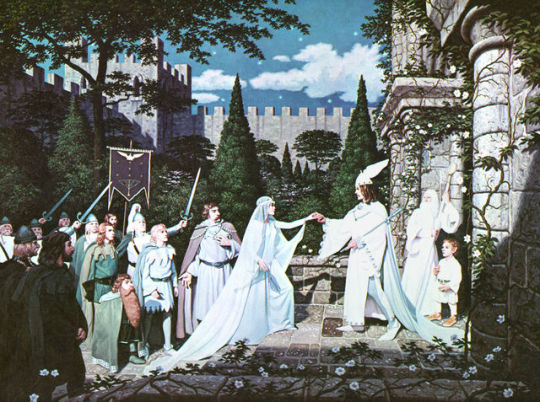
The Wedding by Greg and Tim Hildebrandt
83 notes
·
View notes
Text
#lotr#jrr tolkien#lotr books#lord of the rings#lotr movies#lotr arwen#lotr book vs film#lotr appendices#appendix a#the tale of aragorn and arwen#lotr trilogy#arwen#arwen undomiel#arwen evenstar
3 notes
·
View notes
Text
“I would rather share one lifetime with you than face all the Ages of this world alone. I choose a mortal life.”
-Arwen
4 notes
·
View notes
Text
Tolkien said that one of the things he didn't like about LotR was that the book was too short.
In a way I agree with him, because I found the ending so rushed [others always say "that evil" is destroyed in the middle of the book and everything after is just an long epilogue] and yet I found it rushed. And I wanted a lot of the appendices to be narrated chapters, it was interesting to see what the lives of each member of the Fellowship were like in the appendices, but I wanted chapters about.
And I would also like to have seen, narrated chapters, of the Battle of Dale, with Brand (Son of Bain, son of Bard) and Dáin fighting three days against enemy armies and dying. I wish had read a narrative of Thranduill and Celeborn uniting in Mirkwood and destroying Dul Guldur once and for all, and then dividing the region between them.
When LotR informs that the others would not come to battle because they already had war at their gates, I wanted the plot to split to show this in other parts.
A better development of the romance between some characters would also be interesting, the Tale of Aragorn and Arwen already makes me cry every time I read it, but I feel like it would be more interesting as a narrative than an appendix. If their marriage went on for another 100 pages I wouldn't mind. And I would like Arwen and Elrond's conversations not to be just subtext.
Faramir and Éowyn, I really love them as a couple, but I think more pages dedicated to their romance would also be interesting. Sam and Rose? I would have liked it more if we had more mentions of the girl throughout the journey, if Sam mentioned her more often throughout the plot, so maybe the end wouldn't seem so sudden.
When I say that don't like the development of the "love pairings" in LotR, it's not that I don't like the characters or the ships, but that the narrative wasn't enough for me.
Don't get me wrong, I love LotR. But I wanted there to be more to be "narrated" than "told" or "implied" or "pointed out in the appendices."
Yes, I also thought the book was too short.
There is a lot between the lines that could come to light more. It could have been another thousand pages. And perhaps it still wasn't enough. How could anyone think that LotR is a very long book?
Maybe that's the problem with Tolkien creating such a complex Universe with such interesting characters: no matter how long the book was, it would never be enough. Because as a fan, I would always want more and more of it. More immersion at all points.
Is it always like this with authors who create universes that seem so incredible to read? And when it's gone, it's not enough to fill the void.
And all the posthumous books, like The Silmarillion, or Unfinished Tales (and others), with the tone of "organized drafts" and "told" instead of narrated most of the time, weren't enough for me. I still wanted so much more. And I never will have it.
Don't get me wrong, I liked the posthumous books, I think Christopher Tolkien did a good work. But still, when reading, I always asked myself "if this had been published by Tolkien during his lifetime, would it have been like this? What would he have changed yet? What would he have more refined?".
Because, as much as other fans like to see posthumous books as a "canonical" part of the work, like complements. I can only see as unfinished drafts, which it truly are. No matter how well organized are, even The Silmarillion is just a draft organized in the best way, Christopher T says this.
The letters don't count for me either, because Tolkien changed his mind about several things, just like in the drafts.
So I feel that, although the Tolkien Universe is vast, there are a lot of drafts and letters, and little work is actually completed.
I liked the posthumous books and the fact that they expanded the universe even further and provided more information. But it becomes a “vicious cycle”, as the information contained there also brings more desire for it be narrated by Tolkien himself in an book he finished (but will never be! Unfortunately).
And that saddens me. Because I wanted so much more. And Tolkien didn't live long enough to give it. In the end, it's a mix of happiness for what Tolkien gave, and sadness for what he still could have given.
#lord of the rings#lotr#the fellowship of the ring#the return of the king#tolkien books#eowyn#faramir#aragorn#arwen#elrond#thranduil#celeborn#the silmarillion#unfinished tales#the hobbit
239 notes
·
View notes
Text
YouTube - Instagram - TikTok profile brimariepaints
134 notes
·
View notes
Photo
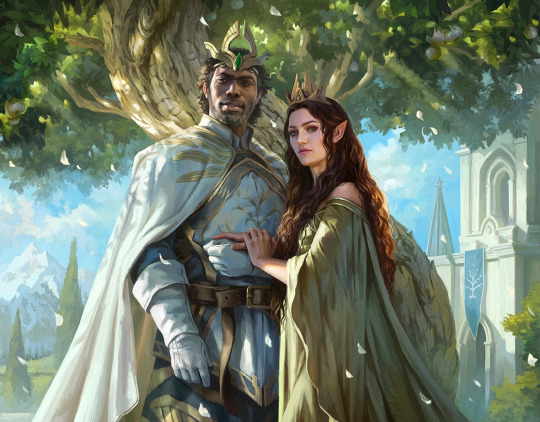
Aragorn and Arwen, Wed, by Magali Villeneuve. From The Lord of the Rings: Tales of Middle-earth.
“Aragorn the King Elessar wedded Arwen Undómiel, and the tale of their long waiting and labors came to fulfillment.”
#art#magali villeneuve#tolkien#lotr#aragorn#arwen undomiel#gondor#minas tirith#the lord of the rings: tales of middle-earth
123 notes
·
View notes
Photo
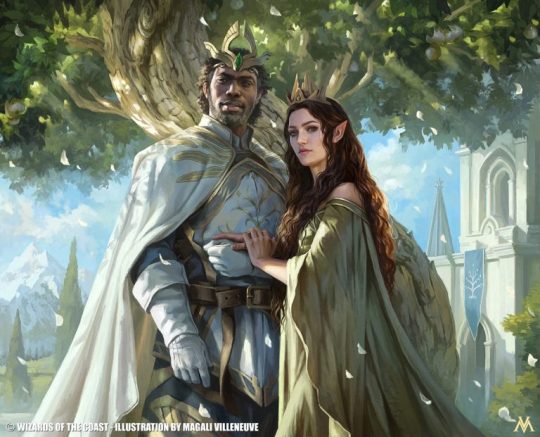
Aragorn & Arwen, Wed by Magali Villeneuve
#Magic the Gathering#MtG#MtGLOR#Universes Beyond#Lord of the Rings: Tales of Middle Earth#Aragorn & Arwen Wed#Fantasy#Art#Magali Villeneuve#Wizards of the Coast
110 notes
·
View notes
Text
a petty complaint but still: to the various posts i’ve seen about how Aragorn disrespects Lúthien by summing up her entire life and legacy as “she died” - that’s movie Aragorn. book Aragorn sings his nine-stanza song about Beren and Lúthien, gives a quick history lesson of the First Age, credits Lúthien with rescuing Beren from Sauron, explains how they successfully stole a Silmaril together, and then how Beren dies and she follows him and gets him back, before they both die. and then he explains how her heritage lives on! like slander book Aragorn for the things he actually does, if you want, but not for giving Lúthien short shrift in his story. that’s on the movies
#tolkien loved this damn story he's going to make aragorn monologue about it. not write lúthien off with two words#the movies are playing up their 'aragorn fears arwen dying for his sake etc etc' thing so of course in that version#he'd focus on what mortality cost her#but in the book he's like naming all her descendants and telling tales of her + beren's feats like he *wants* to be part of this story#also he's literally her descendant himself - he mentions the kings of númenor even. and he's trying to rp beren in his own life#lúthien's story very much means more to him than her death#it doesn't end with 'she died' that misses the point so hard! which the movies did but aragorn in this instance does not#clearly i am critical of the movies. and the books lol whenever warranted but in this case noooo stop saying aragorn said this#aragorn#luthien#lord of the rings#tolkien#skravler#lotr
537 notes
·
View notes
Text
I find it very interesting that when the hobbits were like "tell us one of the Old Tales" and Aragorn chooses a comforting one in the form of the Tale of Beren and Luthien. In isolation, it's a good choice. There's hope amid hardship and people achieving impossible tasks with the power of love. It's very comforting if you're about to be attacked by evil creatures.
However, with the context of Aragorn and Arwen, you have to ask how many times has that been Aragorn's comfort to himself? How many cold nights in the wilderness has Aragorn spent imagining Beren doing the same thing? Does the successful taking of a Silmaril turn Aragorn's task of becoming King of Gondor and Arnor from "Impossible" to only "Very Difficult"? Or does it turn it into a sort of destiny that can and will be fulfilled? That he won't be stuck roaming the world alone for all his long life?
#i like thinking about how aragorn must interact and relate to the Old Tales#also i could definitely make another post like this about arwen#or about how aware the two of them must be about how closely their story mirrors beren and luthien#lotr spoilers#lotr newsletter spoilers#lotr newsletter#lotr#my stuff
86 notes
·
View notes
Text
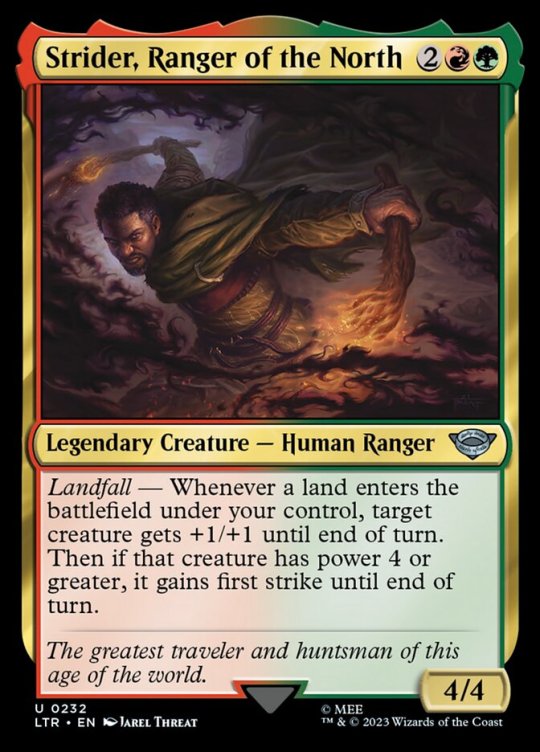


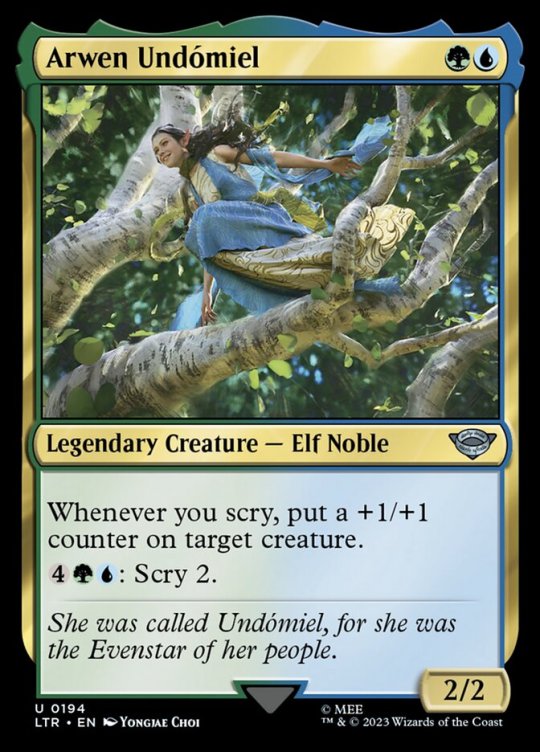

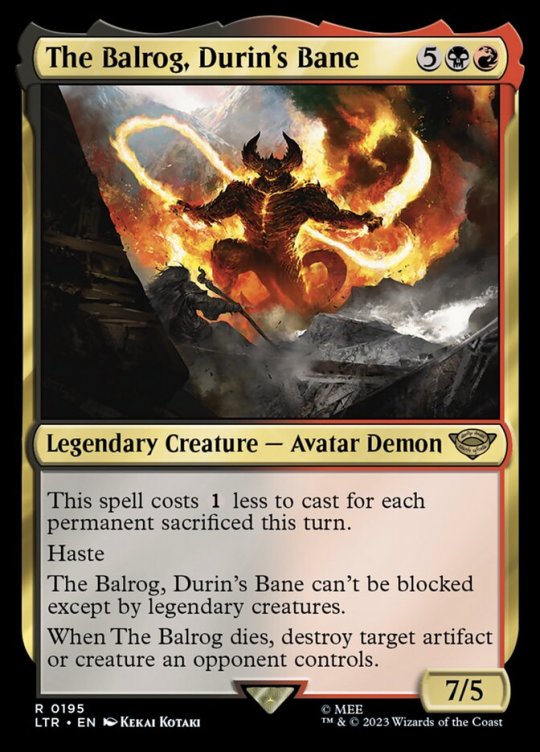

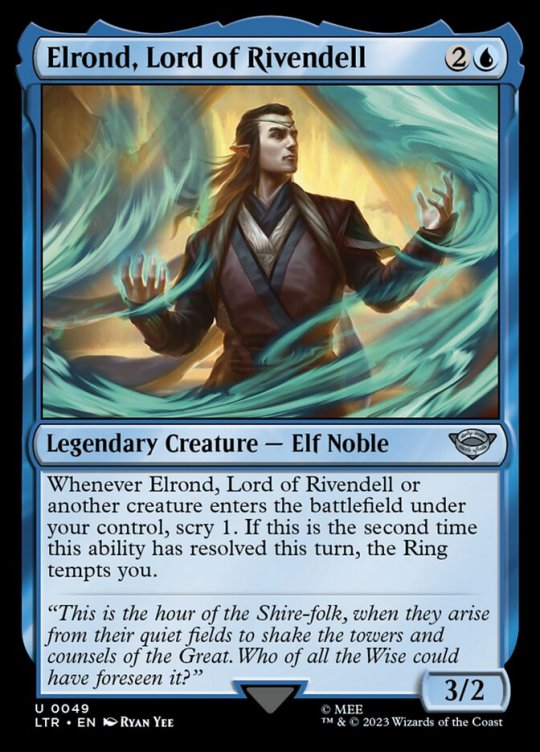
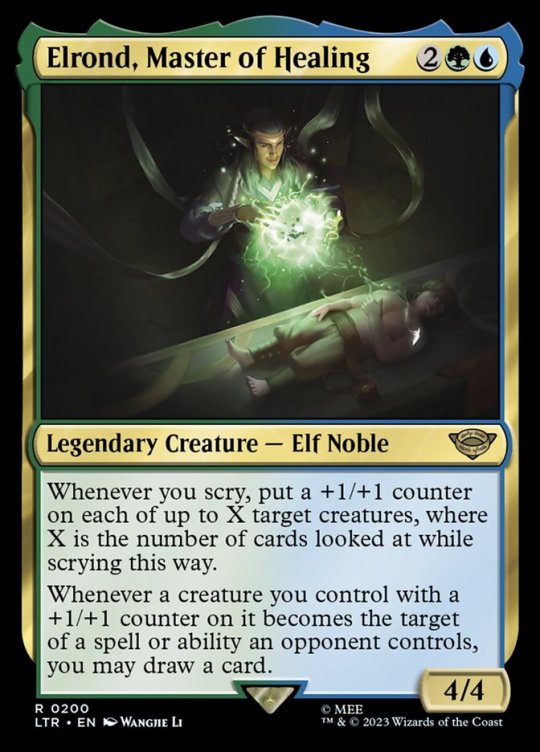
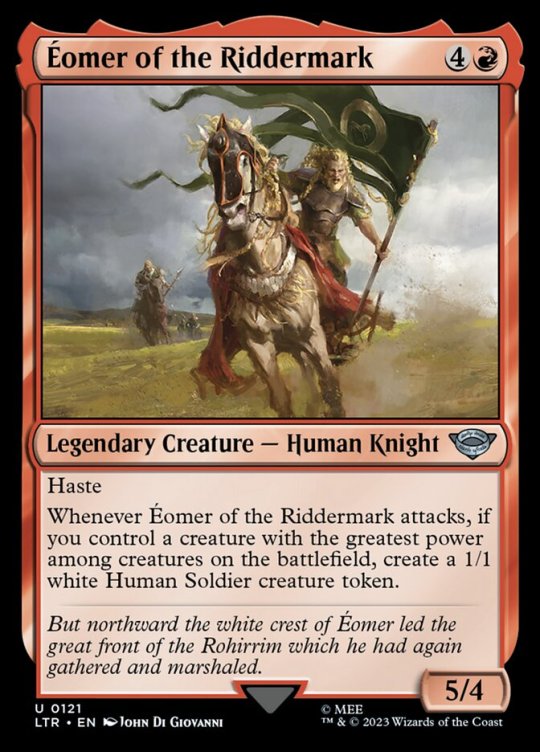
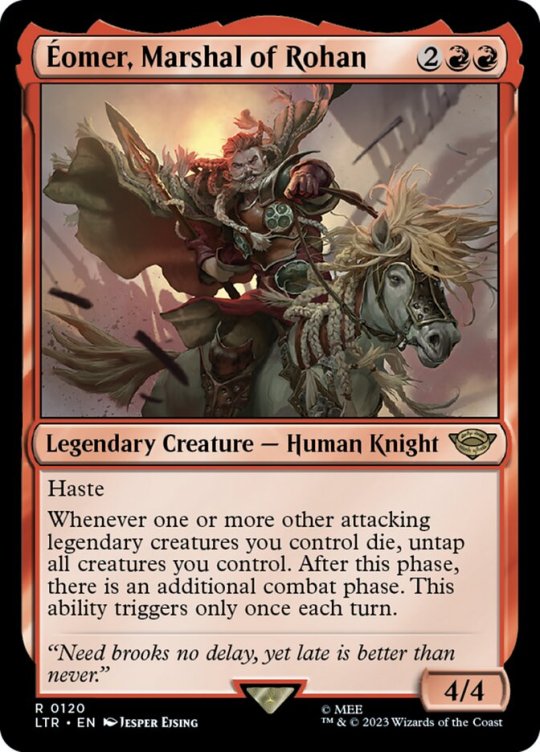
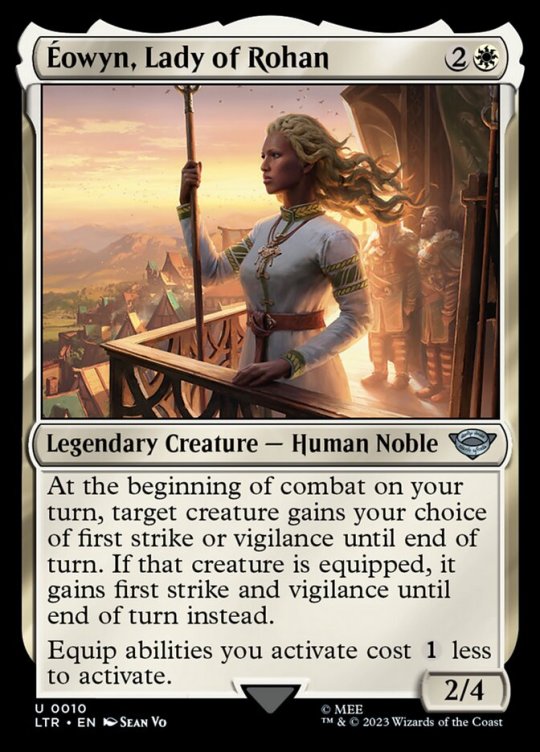

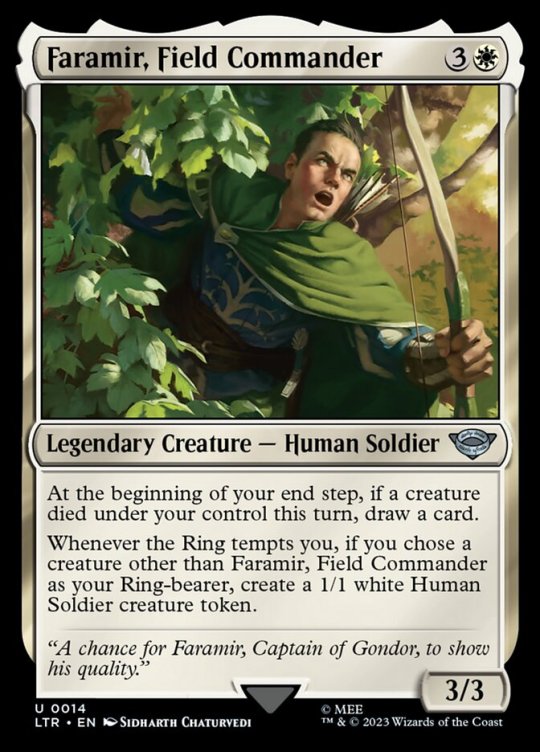
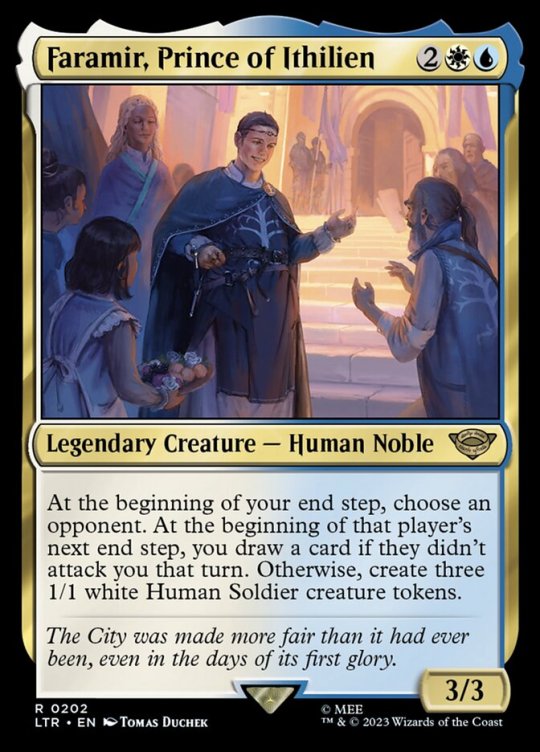




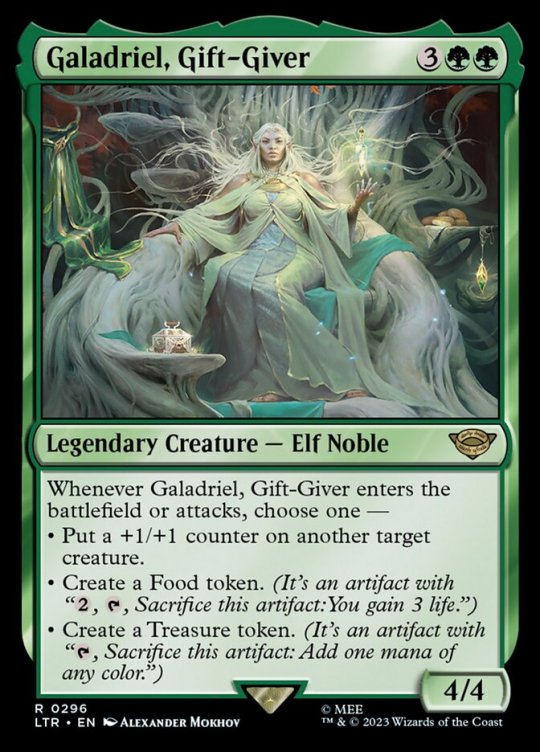
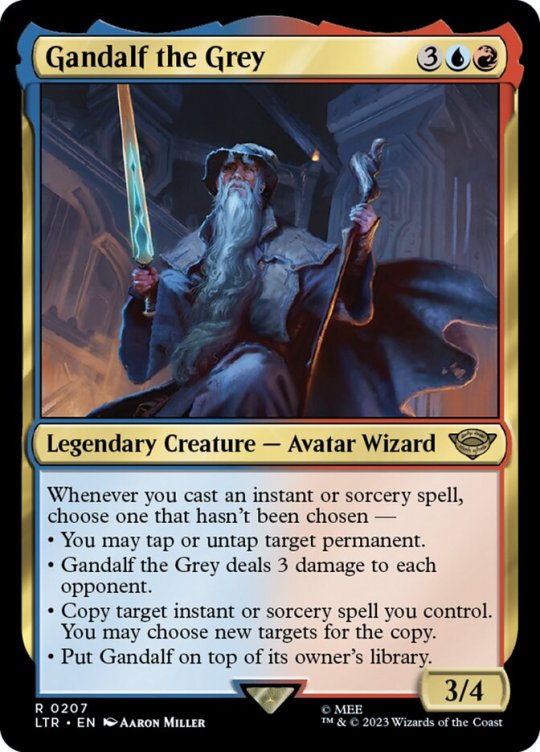

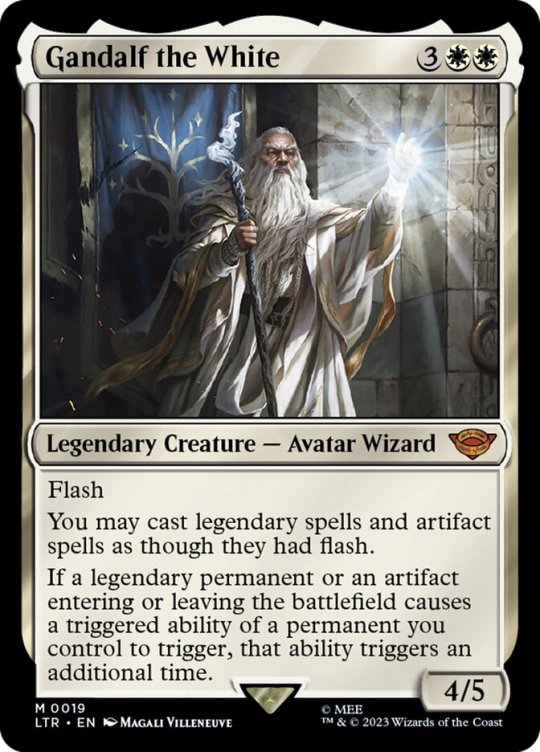
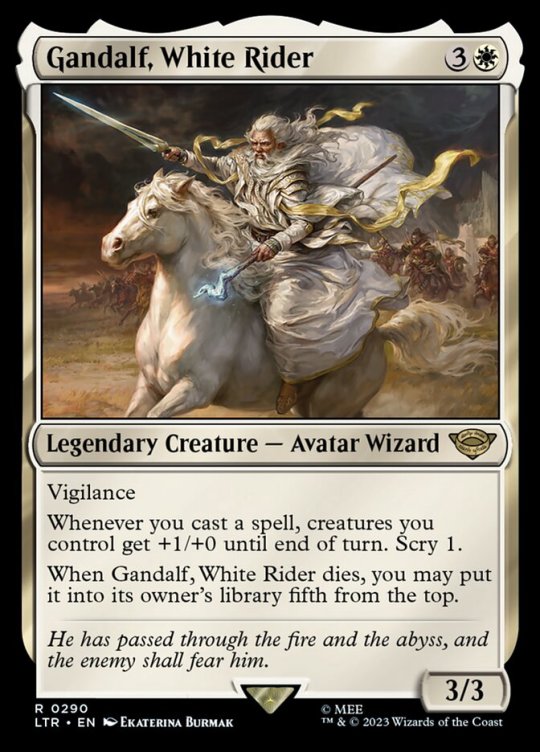
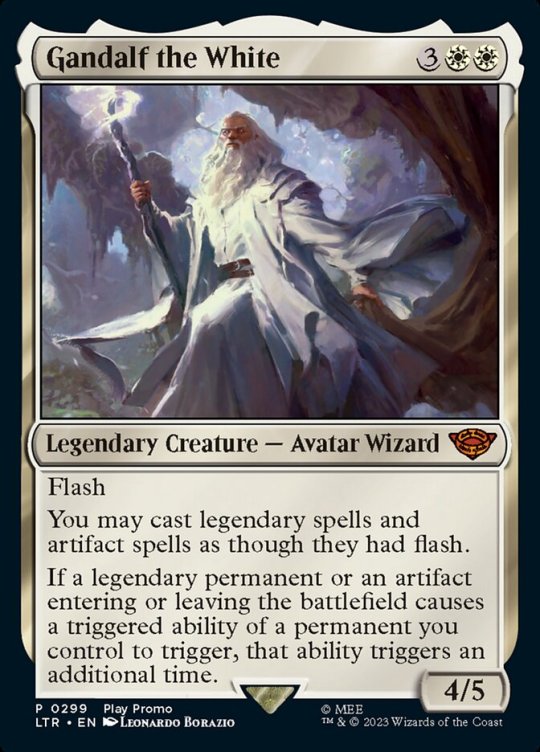
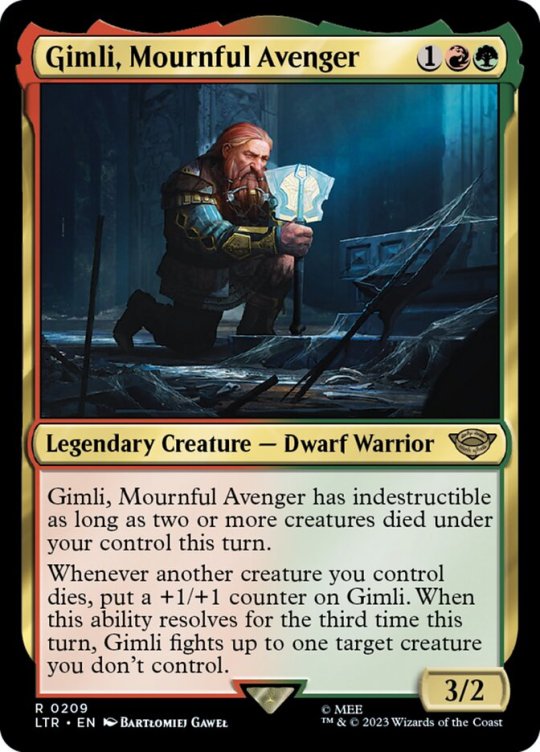

Magic the Gathering - The Lord of the Rings: Tales of Middle-earth
Character cards (1)
One of the specificity of this set adaptation (which is actually a typical thing of modern MtG set) is that for several of the main characters (well, a LOT of them), the set doesn't just offer one card - but several, each one representing a different aspect or evolution of the character throughout the books.
Here above for example, you have the cards of Aragorn, Arwen, the Balrog, Elrond, Eomer, Eowyn (sorry I do not include the accents), Faramir, Frodo, Galadriel, Gandalf and Gimli. PS: If you are wondering why there are two "Gandalf the White" cards, it is because one of the two is a promotional variant. Something similar happened with "Saruman of the Many Colors".)
#magic the gathering#mtg#the lord of the rings#lotr#tales of middle earth#elrond#aragorn#arwen#gandalf#gimli#faramir#frodo#galadriel#balrog
18 notes
·
View notes
Note
Eowyn, 1
1 - in lonely beds
ive finally scraped together a functional first scene for my accidentally-a-psych 3 hunters detective agency au. if you guys like this mess i'll turn it into a real fic. with chapters and a plot and everything!!!!!
the prompt is ... interpreted but loneliness and my girl eowyn are well acquainted
It is four o'clock on a Tuesday and Eowyn Eomundsdottir has three significant problems.
Arrest, rapid-onset dementia, and laundry.
Each of her issues is easily explainable if considered separately. Eowyn is the first to admit that her brother Eomer’s always had a bit of a temper, and if she puts aside the necessary development of maturity and commitment to familial responsibilities that happened after their parents died, it was always a matter of time before some poor idiot pressed his buttons in just the wrong-enough way in front of another just the wrong-enough idiot to get him jailed overnight for knocking in an unwitting nose.
Plenty of people’s uncles develop rapid-onset dementia, she is freely ready to acknowledge.
And – if Eowyn may be so self-aware – she has certainly fallen behind on her laundry many times before.
But no matter how short her brother’s temper, he wouldn’t be arrested for trying to embezzle family funds. Rapid-onset dementia is far less likely when there is next to nil history of it in your family tree, and even less so when the Uncle in question is a scant fifty-three and doing perfectly fine not two months ago. And, most importantly: Eowyn has fallen behind on laundry before, but never because of the above-mentioned two issues, and never such that the only thing she’s got left to wear is a thin white sundress from when she was fourteen that is too short at the knees and not at all suited for the early spring cold spell they are currently experiencing, nor the creepy wandering eyes of Uncle Theoden’s new business manager, who routinely looks like he’s been doused in oil.
It’s fucking miserable, is what it is. Her knees have goosepimpled, she’s so cold. And to make matters worse, her cousin Theodred, whom she would usually text for help in a crisis, seems to have blocked her phone number.
That, Eowyn simply can’t believe.
It’s because of all these things that she finds herself standing at the dingy brick building by the docks, eyeing the circling seagulls warily, and clutching her backpack in one hand and her bike helmet — which has left her long blonde hair looking like a birds nest — in the other. It’s a small place, with a glass window in place of a front wall that’s got the blinds drawn on the inside. There’s no official sign, but someone has taped a small piece of cardstock to the back of the windowpane, facing out. It reads, in surprisingly elegant black Sharpie penmanship:
Telcontar, Gloinson & Thranduilion
Private Investigators for Hire
Beneath this, there is an additionally taped series of brightly coloured post-it notes, which are scrawled over with the following in various hands:
Got a phone! +1591-334-9920
(If no one answers the door, call the number! We DO NOT have a website.)
That’s because Gimli thinks the government is spying on us.
SO DO YOU!
All inquiries welcome :-)
Eowyn takes a moment to read through it all. Then she pauses, listening. There is the distinct sound of voices from within, muffled. So someone must be home, then – better just to open the door, rather than knock, in case no one hears her. She takes a deep, steadying breath, tugs at the too-short hem of her dress, and twists the doorknob.
Inside there is what can only be described as carefully organized chaos.
Within the small office space there is a cluttered desk housing a laptop and overlarge monitor. Boxes cover everything, as though someone has only just moved in, and a lopsided whiteboard rests against the far wall, covered in a far less elegant version than the hand that wrote the outside sign. Everything smells a little bit like camphor, and also cookies, and a very faint touch of gym socks. A man sits on a rolly chair in the corner; he is on his cellphone. Eowyn wouldn’t have even seen him if he wasn’t talking, so well does he somehow blend into the taupe walls and cluttered box decor, but as she does: he is tall (too tall for the chair), dark haired, and wearing an old grey hoodie, running shoes, and an abominably ratty pair of jeans. He’s talking on the phone in a low gentle voice that is nonetheless a touch put-upon, but nowhere near snippy or even frustrated. Eowyn (in a fit of fancy) doesn’t think a voice like that could be capable of snippiness, and then promptly feels very embarrassed by her own foolishness. At his feet, by the bottom of the whiteboard, a pile of dirty blankets rests. From within them sounds a plaintive meowing. Opera music plays from a speaker system Eowyn can’t see; a hammer (maybe?) is banging somewhere in the distant back room, the door to which hangs open on squeaky hinges; and two other voices can be heard arguing loudly from the same general direction.
Also, there is a young man, around Eowyn’s own age, standing very awkwardly with his green jumper and moppish brown hair to the immediate left of the door and looking as if he’s not sure what he’s supposed to be doing with himself. At Eowyn’s bewildered look, he offers her a pained smile and a weird little wave hullo. Eowyn waves weirdly back.
“Yeah – yeah, just a second. We’ve got a client –” The man in the rolly chair looks up at Eowyn and smiles. It is such a very nice, genuinely kind smile that Eowyn cannot help but smile back immediately and then feel her whole face go red; she’d be thoroughly soothed if she wasn’t also feeling so completely out of her depth. Bang bang bang, comes the hammer from the back room, along with a swelling of the arguing voices. “Someone will be with you in a second,” whisper-mouths the man. Then he reaches down, takes off one of his running shoes, and flings it very expertly through the open door. There is a small noise, like a crash, and the other two voices stop. He returns to his phone call.
“... what I was saying. No. No, I don’t want you to be halfway across the world. That’s not the point, the point is your dad stopped practicing ten years ago and now owns a bed and breakfast. He’s not the one who’d be navigating a corrupt healthcare system. Do you know how much lobby money lines the pockets of mega corporations? Remember the whole Nestle baby formula thing? The media definitely doesn’t …”
“Good afternoon!” declares a second, much louder voice, minutes before its owner materializes behind the cluttered desk. He is more beard than man, wears a very formal and very 1990s plum coloured suit and one single gold earring, and comes up to about Eowyn’s shoulder. He claps his hands together. “Now, which of you was here first? No – don’t tell me, I will guess!”
But his imminent guessing is interrupted by the third voice, floating in:
“I still can’t find it!”
Desk man deflates by a margin. Without turning his head, he calls,
“I told you to look in the third box!”
“I looked there. It’s not there, Gimli. I’ll try going through the books.”
“Why would a thing like that fit in a book?”
“Try the kitchen,” mouths the man on the rolly chair. A muffled woman’s voice comes through his mobile. He has one hand covering his face now, and his head tipped back to face the ceiling. “Well, yes – I do know that. You’re really telling me you don’t want to go to Paris for a year.” While Eowyn watches the meowing blanket pile moves and from within it a truly horrible looking little cat emerges. It shoots one paw out as if intending specifically to scratch its phone-occupied companion; the speed at which he moves his foot to pin the blankets hem and thwart the little paw is bordering on superhuman. Cat hisses pathetically from under its blanket prison. On the speakers, the opera singer has reached a uniquely high pitch in her stanza. “No, obviously I don’t want to do long-distance, I just think — uh huh. Yes. I’d tell anyone to go to Paris. I’d tell Gimli to go, if Gimli’s university was offering to send him to Paris.”
“He’s already tried the kitchen,” says the man at the desk – presumably Gimli. Still, he yells out, “Try the kitchen, would you?”
“I’ve already tried the kitchen!” calls the disembodied voice. “I can’t find it!”
“You can’t find it because of your terrible organizational system.”
“It is not my terrible organizational system, which you know, and besides which I have never had problems with it before.”
“No,” from the rolling chair, “Legolas is maligning my organizational skills. I know you think they’re fine, so you can tell your cousin that on Sunday …”
“Try the kitchen.”
“I’ve tried the kitchen twice.”
Bang bang bang, continues the sound from the back room. Eowyn wonders if there isn’t an ongoing construction project. The young guy on her left, with the moppish hair and jumper, gives her a look as if to say, Filing cabinet, maybe?
“As you can see, gentle lady,” explains Gimli the desk man, very politely to Eowyn, while the second voice declares somewhat redundantly that he is, in fact, going to check the kitchen, “we are a tad busy this afternoon. Someone will be with you momentarily.” He turns, presumably in the kitchen’s direction, and calls out, “if you ask my opinion on the subject again, I’ll wallop you with Aragorn’s dratted guitar!”
Eowyn looks. There indeed is a battered old guitar, perched merrily on a pile of papers behind the front desk, ready to be used for walloping.
“I could come back later,” says Eowyn. She looks over at jumper guy, who’s staring at the still-hissing pile of blankets with some concern. “Can’t really speak for him, though.”
Jumper guy looks aggrieved. “Er – no, I’d rather not come back later. Gandalf said you’d be free to help.”
“And help –” begins Gimli, while there is another crash from the back room (they all wince, though Gimli does it with serenity) “-- we shall! If you give my colleague Legolas a moment to get his head on straight –” (the disembodied voice says something very rude in response to this pointed inflection), “-- then the two of us will be at your disposal.”
“Three of us,” interjects the first, almost forgotten voice.
Eowyn and her jumper-clad companion turn startled to look: cellphone put away, rolly chair man has stood up to his quite considerable height and is looking at them consideringly. Despite his mildness of expression Eowyn experiences the uncomfortable feeling of being looked at by someone who could in a more fantastical setting have, like, laser vision or something – how is he doing it? And she is sure he isn’t really seeing right through her but she does get the sense he is understanding a lot more than she’d like to let on. Almost defiantly she tugs at her dress and clutches her bike helmet closer to herself. Jumper guy clears his throat. Then from the back room comes – presumably – Legolas, who is fair, thin, and for reasons unexplained wearing sunglasses indoors. He is also covered in what Eowyn hopes are pillow feathers and holding, in one hand, a very large glittering silver sword, and in the other a dingy looking VHS tape. It has cartoon vegetables in cloaks on the front.
“Did anyone know we still had this?” he asks pleasantly, and it is not clear to which find he is referring, “Arwen and I used to stare at it for hours as kids.” He spots Eowyn and her jumper-clad counterpart. “Oh – hello!”
Eowyn gapes. The three of them make a fascinating picture, standing there alongside each other.
“Now then,” says the man called Gimli. “Faramir, we know of already –” he nods at the boy beside Eowyn, who looks a bit bewildered by this, “as Gandalf sent him here! But this young lady we do not. How can we help?”
Perhaps it is the blinding reflection of the hopefully-a-prop sword, but Eowyn is suddenly overtaken by an awful affliction of watery eyes, which has nothing at all to do with her general feelings of overwhelm — until now expertly repressed — she is sure. She feels at once full of despair and yet shaking with eagerness, and everything she’d been desperate to explain to a listening ear gets stuck in her throat in the face of three, admittedly sort of weird (somewhat stern, verging on intense, dipping into outright comical), thoroughly kind faces looking right at her. It suddenly occurs to her how horribly, horribly alone she’s felt for the past six weeks.
She remains rooted to the spot and tragically mute while Faramir, from beside her, begins all at once,
“I wasn’t sure where to go. I didn’t want it getting back to dad, so Gandalf seemed like the best option — and he said you were very trustworthy, and I do trust Gandalf of course – but it's my brother, you see, he’s disappeared,” vaguely Eowyn is aware of a grim look of surprise rippling through the collective at this reveal, “and it’ll sound crazy but I had this awful dream two weeks ago …”
While Eowyn attempts to wrangle her misbehaving emotions like one would a wobbly-legged yet stubbornly misbehaving colt, an impromptu consultation begins.
“Gone missing?”
“I bet he went hiking or something and lost his phone. It’s happened before.”
“Boromir hates hiking, though. Remember when Aragorn tried to bring him camping with us?”
“No wonder Gandalf sent you here.”
“I have odd dreams too sometimes; they are usually because of indigestion. I’m sure old Boromir’s just fine.”
“No,” insists Faramir, who seems – in Eowyn’s half-attentive estimation – to be doing an admirable job at hiding his surprise at this existing knowledge of his brother. “He’s not answering my texts – it’s like he’s blocked my number, which doesn’t make any sense!”
Eowyn’s head jerks around to stare at him.
Could it be a coincidence? That is exactly the thought she herself had, not an hour ago, about her own cousin. Is it possible that she isn’t crazy, and her awful yearning for Eomer to be here and not in overnight jail, so someone who is not Eowyn could deal with things, is not childish? She opens her mouth, but her words are stuck again. All she can do is inhale like a small bird puffing up its chest and make a very very faint squeaking noise, which she is mostly sure no one can hear.
“Legolas,” interjects rolly chair man. His sharp grey eyes, which had flitted around briefly and shrewdly throughout the hubbub, are now fixed again on Eowyn, and thoughtful. The commotion dies down. In a mild voice he says, “Maybe you could fetch a clean pair of gym shorts and a blanket to lend our new friend, so she’ll be a bit more comfortable.”
Eowyn, swaying a bit on the spot, hadn't even realized she was tugging at her dress again.
“Oh,” she manages.
“Aye, I’d say you’re about the same size,” agrees Gimli, to Legolas, after a beat. “Aragorn has a good eye for these things,” he adds, as if needing their prospective clients in crisis to know this.
“I’ll bring her a comb, too,” says Legolas, not at all meanly, and goes to fetch these things.
“And I’ll put on some tea,” says Aragorn, so named, and for a second time his face softens with that warm, open smile. “I’m Aragorn,” he continues. “Let’s all sit down, and you can both start from the beginning; everything will be alright.”
In the moment after this offer Eowyn locks eyes with Faramir. He is standing next to her. His jumper looks particularly sad now that she is paying attention. He isn’t looking at Aragorn or the sword or the pillow feathers Legolas left behind, but at her. Right at her. There’s a solidarity there. It would be a touching exchange, Eowyn thinks, if not for the fact that the feral cat in its blanket pile has started talking to itself in oddly pitched meows.
A large crash sounds from the back room, accompanied by the sound of a child swearing.
“Yeah, okay,” Eowyn says.
For the rest of today, at least, she has decided that she refuses to feel alone.
#my writing#taylor swift prompt memes#lord of the rings#eowyn#faramir#eowyn x faramir#aragorn#gimli#legolas#legolas x gimli#aragorn x arwen#for those wondering yes the veggie tales vhs is lord of the beans#and the cat IS gollum
42 notes
·
View notes
Photo
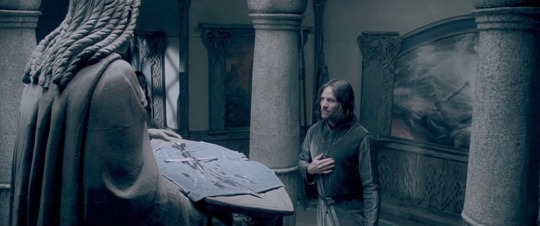
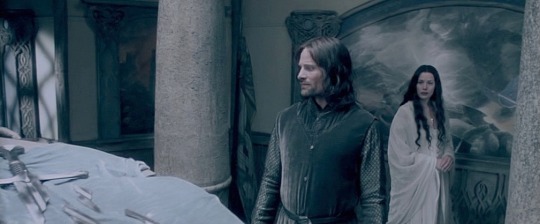
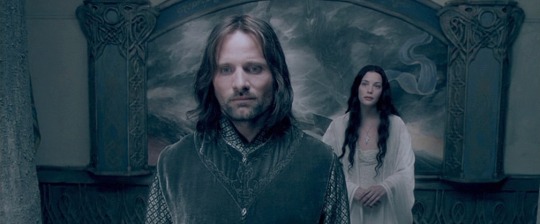

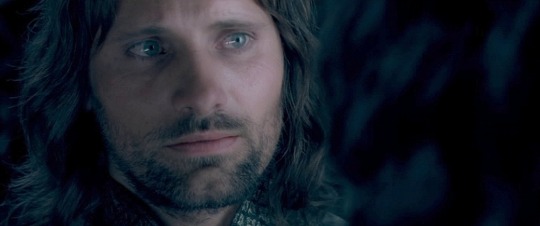
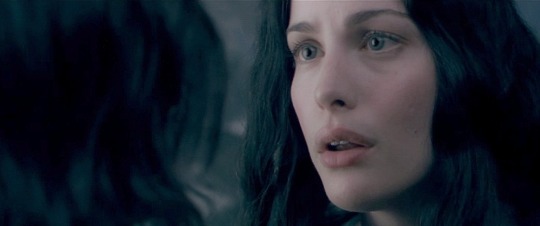

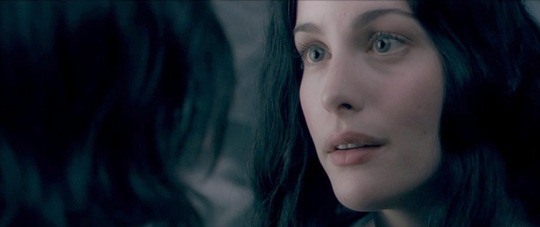
“Dark is the Shadow, and yet my heart rejoices” ...
... Arwen said. “For you, Estel, shall be among the great whose valour will destroy it.’’
But Aragorn answered: ‘‘Alas! I cannot foresee it, and how it may come to pass is hidden from me. Yet with your hope I will hope. And the Shadow I utterly reject.”

JRR Tolkien, The Lord of the Rings, APPENDICES: Annals of the kings and rulers, The Númenórean Kings, Tale of Aragorn and Arwen
#the lord of the rings#appendices#annals of the kings and rulers#the numenorean kings#tale of aragorn and arwen#jrr tolkien#aragorn#arwen#movie pics#peter jackson
74 notes
·
View notes
Text
#lotr#jrr tolkien#lord of the rings#lotr books#lotr movies#lotr book vs film#lotr appendices#appendix a#the tale of aragorn and arwen#aragorn#arwen undomiel#king elessar#aragorn x arwen#lotr trilogy#lotr poll#lotr comparison
0 notes
Text
Where Are My Mutuals?
I've been on Tumblr for two years and barely connect with anyone. It's time for a change. In a vain attempt to connect with people, I shall list my interests. I have too many to fit in one post, so here's Volume One: Classic Literature. Stay tuned for more. Do not adjust your set. Make Tumblr Interactive Again.
Lord of the Rings. (currently working on a "sauron gets the ring" AU with my nerd brother but that's another story) I would die for Pippin. Also for Frodo. Eowyn and Faramir are one of my favorite ships. Also Aragorn/Arwen and their parallels to Beren/Luthien. (Tolkien feels like a beloved character himself because of his own beautiful love story with Edith and all the mischief he got up to with CS Lewis.) Can't remember if I've finished the Silmarillion but I should someday.
Which brings me to mythology! I (metaphorically) burned through most of the mythology section in the children's library as a kid. I'd like to know more about Native American myths from my region someday.
Greek myths: Eros and Psyche. Persephone and Hades of course. Orpheus and Eurydice. (I know most of the lyrics to Hadestown.) LOVE Prometheus. (And many other Christ figures, including but not limited to Jesus.) Pygmalion/Galatea has some nice potential for stories but I haven't thought about it much. Endymion/Selene is a beautiful story.
Norse: I'm not as into Norse myth but Neil Gaiman's obsession with Odin makes me go "all right, he's cool." Loki (myth Loki is a separate character from Movie Loki) is redheaded and dangerous and tricky and beautiful. Anything Loki or Odin does interests me. The other gods, not so much.
Celtic: I can't remember that many but I liked Cuchulainn, the Morrigan, and anything about the Tuatha de Danann and Tir-na-nOg. Their myths and gods mostly descended into fairy tales and fairies under Christianity, so I also like the stories of the Sidhe and their kidnappings and magic.
Fairy tales. I also burned through most of the fairy tale section as a kid. (NOT LITERALLY.) I liked all the different Cinderella stories, and Rapunzel, Sleeping Beauty, Beauty and the Beast, Snow White, Red Riding Hood, and anything else pretty or bloody. Grimm's Fairy Tales are hit or miss because the moralizing sometimes outweighs the drama.
Shakespeare. Oh Boy. Hamlet (I could fill a notebook with theories on Ophelia and ideas of how to play her), Much Ado About Nothing (I'm told I could play a good Beatrice...if I knew how to act, that is), Romeo and Juliet (as glorious to this night as angels are unto the white-upturned wondering eyes of mortals that fall back to gaze on them), Henry V (but only if he's played by Tom Hiddleston), Twelfth Night, Midsummer Night's Dream, Macbeth (I didn't say it, I wrote it, don't @ me). I go to a Shakespeare play every year on my birthday. So far I've seen Midsummer Night's Dream, Twelfth Night, and As You Like It. This year I'll see Much Ado.
The King Arthur legends. Recently read John Steinbeck's version. I like all the magic women. Morgan, Morgause, the Lady of the Lake, Nyneve. The Sword in the Stone by TH White is wonderful.
#long post#where are my mutuals#lord of the rings#faramir x eowyn#aragorn x arwen#pippin#frodo#beren x luthien#silmarillion#tolkien#greek myth#eros and psyche#hades and persephone#orpheus and eurydice#prometheus#norse myth#odin#loki#celtic myth#tuatha de danann#tir na nog#fairy tales#sleeping beauty#snow white#shakespeare#hamlet#twelfth night#much ado#sidhe#king arthur
5 notes
·
View notes